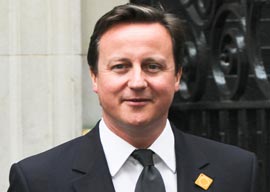
May 14, 2015

David Cameron
Source: Shutterstock
Just after 10pm last Thursday, the BBC was allowed to broadcast the results of the exit poll it had been conducting outside voting stations during election day. Its conclusion that there would be a clear Conservative majority stunned studio guests and media observers alike, all of whom had been expecting a hung, or very nearly balanced, parliament.
The new Commons has 331 Conservative MPs, 232 Labour, 56 SNP, eight Liberal Democrats, eight Democratic Unionists, four Sinn F̩in, three Plaid Cymru, three Social Democratic and Labour Party, two Ulster Unionists, one UKIP, one Green and one Independent. This has given the Conservatives a slender 12 seat majority, the first time there has been a Conservative majority since 1997. The vagaries and patently undemocratic nature of the first-past-the-post system become clear when we consider how well the SNP performed, with 4.7% of the UK vote, and how badly UKIP, with 12.6%. The Conservatives also made gains in local government, which had been expected Рbut so did UKIP, which took control of its first council, Thanet in Kent.
There were big-name losers – Labour’s Ed Balls and Douglas Alexander, Liberal Democrats Danny Alexander and Vince Cable, and UKIP’s Nigel Farage, failing in his seventh (and supposedly final) attempt to win election to the UK Parliament. Although both Ed Miliband and Nick Clegg kept their seats, they resigned as party leaders – Clegg’s petulant parting shot at “the politics of fear and grievance” in marked contrast to David Cameron’s tribute to his erstwhile ally. The biggest-mouthed loser was undoubtedly “Gorgeous” George Galloway, with the electors of Bradford West deciding that they had enjoyed being represented by him for quite long enough. “Venal, vile, racist, Zionist and hyena” burghers accordingly rejected him by an 11,000 margin (which predictably – and pointlessly – he is seeking to overturn).
Another reluctant loser was Nigel Farage. Farage had promised to resign as UKIP leader if he failed to win his seat – and indeed did so, albeit hinting that he might re-apply for the job in the near future. Then unexpectedly he “unresigned”, apparently at the insistence of UKIP members. All this within the space of four days – and now, there are hints that he has not even given up on his dream of being elected to the Commons.
UKIP’s MP, Douglas Carswell, is clearly irritated by Farage’s tergiversations – which have indeed undercut Farage’s reputation as straight-talker, and confirmed the impression that UKIP is a personality cult rather than a party. This does not augur well, especially as former Conservative MP Carswell has hinted on several occasions that he dislikes the tone of UKIP rhetoric, especially on immigration.
So for now, for better or worse, David Cameron is the cynosure of Rightwing hopes. Cameron has a real opportunity to make his mark – whatever it may be. The “modernization” with which he has become synonymous has always been ambiguous, and it is difficult to discern a consistent pattern in policies or personnel. He was seriously circumscribed by coalition, and consequently No. 10 staff have never sought to develop a coherent “Cameronism”. Many of his new MPs, and even ministers, are unknown quantities, so it is difficult to say in which directions they will push him. It may be indicative that there are more female and more state-educated ministers than ever before – but he has also appointed some old-school Tories, like John Whittingdale and Dominic Raab.